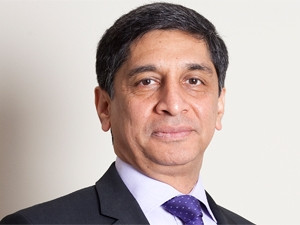
Bandwidth is the new black gold. It is the single biggest driver of change in the technology industry.
So said Sunil Joshi, MD and CEO of Neotel, addressing delegates at the Consumption-based Solutions Enterprise Connectivity Executive Forum held in partnership with ITWeb at Summer Place, Hyde Park, yesterday.
According to Joshi, in 1984, broadband speeds averaged 50Kbps, and in 1993, when the World Wide Web was born, speeds peaked at 56Kbps.
"Now there are faster speeds being rolled out by companies like Nokia and SL Telecom, which recently achieved a throughput speed of 3.78Gbps through the convergence of TDD and FDD LTE spectrums," he said.
At this speed, a user can download a 5Gb HD movie in 11 seconds.
Extreme speeds
There are even faster speeds, he said, pointing to BT and Alcatel Lucent, which recently announced trial speeds of up to 1.4Tbps with a record spectral efficiency of 5.7 bits per second per Hertz on an existing core fibre connection.
This is believed to be the fastest speed ever achieved in commercial grade hardware in a real-world environment, and is equivalent to transmitting 44 uncompressed HD films in a single second, he noted.
"When those speeds become available, what do you think you and your business will be able to do? Broadband is massively changing the way we do business."
He said the current average speed in SA is 3Mbps and it is expected to reach 8Mbps in 2018.
"No matter how much speeds we make available, it will be consumed because of the sheer amount of information that is now available on the Internet for access," he said.
"In 1998, Google had about 10 000 searches in a day; now it's having 68 000 searches in a minute. There has been a shift in the way people are accessing the Internet. The second largest search engine in the world is YouTube, with an average of 100 hours of video uploaded every minute and about six billion hours of video viewed every month."
Engine revolution
Joshi is of the view that engines are now moving from search to answer engines. "In the beginning, we used to say 'let me figure out where I can get the information'; today users ask: 'can somebody give me the answer?'"
In 1991, he said, there was only one Web site in the whole world; and in 2013, the figure rose to 700 million, and one billion in 2014. The accessible data on the World Wide Web in 2013 was 0.7 zettabytes and in 2020, it will be 50 zettabytes.
According to Joshi, a zettabyte is equal to two billion years of music.
In 1992, only a million devices could access the Internet, and in 2014 the number is 14 billion; and expected to hit 50 billion in 2020. In SA, he revealed, there were 92 million such devices in 2013 and they will be 148 million, come 2018.
Regarding IP traffic, Joshi said, in 2013, globally, there was 36 exabytes per month and it is set to reach 102 exabytes in 2018.
To Joshi, an exabyte is equal to all the data on 67 million 16Gb iPhones.
"In 2018, the IP traffic will be 64 times the entire volume of the Internet in 2005."
On a monthly basis, he continued, SA had, on average, 181 petabytes of IP traffic; and the figure is set to hit 792 petabytes in 2018. "By 2018, the gigabyte equivalent of movies ever made will cross SA's IP networks every seven hours."
Networks transform
He also noted broadband networks have evolved over time. In the fixed-line space, he said, networks have evolved from dial-up to ADSL to fibre. On the other hand, wireless networks also revolved from 2G, 3G and WiMax and now technologies like LTE and 5G are coming.
There has also been an evolution in the pricing of broadband, said Joshi, noting that in the 1990s to 2000s, there was separate pricing for connectivity and services; and competitive differentiation was based on pricing and availability of dial-up POPs.
From 2000s to 2010, he said, there was the introduction of integrated pricing for Internet connectivity with competitive differentiation based on price and speed.
"In the future, competitive differentiation will be based on the value of broadband services. By 2020, global fixed connections will reach 990 million; there will also be 12 billion machine-to-machine connections; 30 billion active IP addresses; and six billion smartphones," said Joshi.
He also revealed, though satellite technology is still expensive today, by 2020, there will be an abundance of high-throughput satellites with 100Gbps with 50% of all enterprise terminals using such satellite terminals.
Share